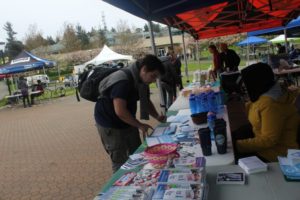The Camosun College Student Society (CCSS) will hold its Sustainability Day on Thursday, October 17.
The event is being held at the Interurban campus and is focused on three “pillars,” according to CCSS sustainability director Tamara Bonsdorf: food, transport, and waste. Bonsdorf feels that the interactive aspect of the day will help instill awareness of what sustainability is and how to apply it to everyday life, as well as give students the chance to have a little fun with a serious subject.
“There will be a food truck there that will have three options of free vegan food—vegetable pakoras and chutney, lentil taco bites, along with a gluten-free option,” says Bonsdorf. “After those, we are most likely going to have the [Environmental Technology] students showing microgreens and showing us how to plant them.”
Bonsdorf says that information about alternative transportation methods will be available at Sustainability Day.
“For the transport pillar, we will have information on how to have alternative transport options, which is helpful especially at Interurban, which is struggling with parking availability, especially with the influx of new students,” she says. “The information will be on the park and ride/walk programs, the Camosun Express, and we are also hoping to have a free bike tune-up station.”

As part of Sustainability Day, the CCSS will be doing an audit on the waste created in the Centre for Business and Access building at Interurban.
“The night before, when the custodian leaves out all the waste bins, some volunteers and myself will organize them and weigh them to see how much was put into the landfill waste that could have been recycled,” says Bonsdorf. “Then we will try to teach on how to properly sort, because we know that there is a lot of confusion about that.”
Second-year University Transfer student Sarah Shumanski says that the secret to teaching sustainability is transparency, and that sustainability shouldn’t just be on a designated day. She says that Camosun College as an institution should be more open about its sustainability practices.
“I am not even sure what Camosun already does, so definitely being more transparent about their current efforts would be a great place to start,” says Shumanski.
Shumanski suggests starting small with things like compostable utensils.
“Also making sure that there are compost bins readily available on campus,” she says, “because some of the recycling [and] garbage stations don’t have compost, so that is encouraging students to keep throwing out their food.”
Shumanski says day-to-day sustainability education is missing from Camosun.
“Honestly, I think that educational opportunities on campus is the best way to promote sustainability to students,” she says.
Second-year Business Administration student Sidney Chapman says that the way to reach students on important issues is to educate them in class.
“I feel that they should be incorporating more content into courses regarding sustainability, as well as other environmental issues today,” says Chapman. “Because if you are just doing, for instance, a Business Admin diploma, you aren’t really exposed to the issues that we are facing. Students need awareness now, because it’s the world we live in. If we are the next leaders in our generation, then I think it’s important to educate us on that.”
Castor Nielsen, also a second-year Business Administration student, agrees that awareness of sustainability should start in the classroom.
“They do put a lot of sustainability into some small parts of the courses,” says Nielsen. “It will often be a topic of projects we have, where we have to reach out to community leaders about their sustainability efforts. But I find it is not exactly mirrored in our lessons.”
Shumanski feels that students would like to have a sustainable college, and that all the college and the CCSS have to do is reach the students.
“It has to be done in a way that gets people interested,” says Shumanski. “Maybe making it so that whoever runs for [CCSS] student council has a sustainability aspect to their platform.”
Nielsen says that transportation is definitely one of the biggest sustainability-related issues at the college.
“Simply because there are so many people driving, as the location is not the most accessible place for people to bus to all the time,” says Nielsen.
Chapman says that there should be more carpooling options available and adds that food waste is a concern.
“One thing I’m also curious about is whether there is food waste in the cafeteria,” says Chapman.
Nielsen adds that there is a lot of paper waste at the college.
“I know that there was a transition into more electronic learning, and that we do a lot of our assignments online,” says Nielsen, “but there is still a ton of paper waste that ends up there.”
